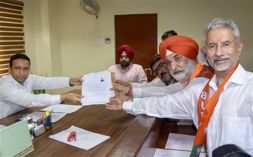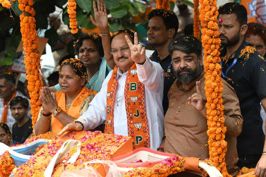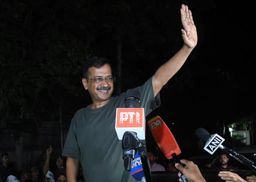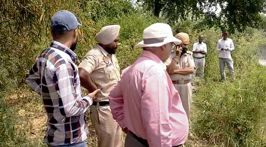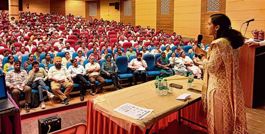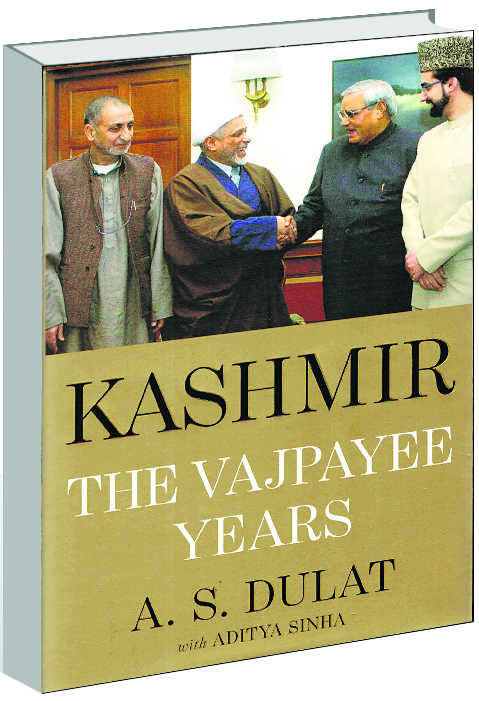
Kashmir: The Vajpayee Years by A.S. Dulat with Aditya Sinha. Harper Collins. Pages 344. Rs 419
Arun Joshi
Kashmir’s story of any period, at any stage, can never be told in its entirety today, tomorrow or the day after. The Valley witnessed a transition to comparative peace for some time during the Vajpayee era (1998-2004). This phase becomes the brightest because Vajpayee’s coinage, “Dialogue within parameters of humanity” and “Extending a hand of friendship to Pakistan,” from Kashmir were epoch-making turns in the blackest period of Jammu and Kashmir, which saw a massacre of dozens of people in the mountains and plains, Kargil war and near-war situation in 2002, in the aftermath of terrorist assault on the Indian Parliament on December 13, 2001.
This setting of Kashmir and the transitory period is there in Kashmir: The Vajpayee Years, written by spymaster A. S. Dulat, but it has been marred by several misrepresentations of facts, missing links, exaggerations and underestimation of some of the crucial events and the dramatis personae. He has tried to compensate this with spicy stories of drinks and cloak and dagger anecdotes in different places in the world. Three other major events of the Vajpayee era were — autonomy resolution, 2002 Assembly polls and dialogue with the Hurriyat Conference.
A point, which Dulat has been able to make successfully is, ‘agencies’, be it Intelligence Bureau or RAW of India or ISI of Pakistan, have made Kashmir their battleground. In their attempts to outmaneuver each other, they have shrouded the real Kashmir and its aspirations. They have escalated the conflict so much to their benefit that the common Kashmiri is unable to see where is he standing.
Leaders like Sheikh Abdullah, Bakshi Ghulam Mohammad, G. M. Sadiq, Farooq Abdullah, Mufti Mohammad Sayeed, Ghulam Hassan Mir, Abdul Ghani Lone, Syed Ali Shah Geelani, Mirwaiz Umar Farooq, Abdul Ghani Bhat, Shabbir Shah, Sajjad Lone, Omar Abdullah and Mehbooba Mufti, all find mention in the book, the obvious overemphasis is on Farooq Abdullah. The description of their role in doing and undoing things has either been exaggerated or underestimated. The same is the case with Firdous Sayeed, Hashim Qureshi, Majid Dar and Syed Salhaa-ud-Din.
Those who have been a witness to the history of the times know that Dulat’s story has some glaring flaws. It was the late Prime Minister Rajiv Gandhi who had told Farooq Abdullah to resign in January 1990 — the newspaper records of that time will tell it all, not the other way round. There were four rounds of talks between Hurriyat Conference and the Centre — not just two in the first quarter of 2004. Two other rounds were held with Prime Minister Manmohan Singh in September 2005 and May 2006. Dulat had no role in that, hence those are not there. The initial rounds were facilitated by others who were eyes and ears of the North and South Blocks since long.
In 2006, the Hurriyat was invited for the second time for the round table conference on Kashmir and Geelani was also among the invitees. The moderate group had insisted on meeting the Prime Minister first and that they did in New Delhi on May 3, 2006. Pakistan’s President Pervez Musharraf had also called the Mirwaiz Umar Farooq, chairman of the Hurriyat faction, to participate in the round table conference, but the Hurriyat leaders had stayed away for they had their own reasons.
The autonomy report and the resolution in the legislature had their background. The Government of India had started talking with the Hurriyat leaders through intermediaries like R. K. Misra and Wajahat Habibullah. The report was prepared in a hurry, seeking pre-1953 autonomous status for Jammu and Kashmir, when the state had complete sovereignty barring over the defence, communications and the foreign affairs, under the signatures of its members and Chairman Ghulam Mohi-ud-Din Shah and tabled in the Assembly in April 2000 (not 1999). The special session of the legislature lasted for eight days and the resolution was adopted on July 1, 2000. These were the defining moments.
The real causes of inaction in the case of IC-814 and the exchange of militant leaders are also not there. It’s yet another book on Kashmir!





















